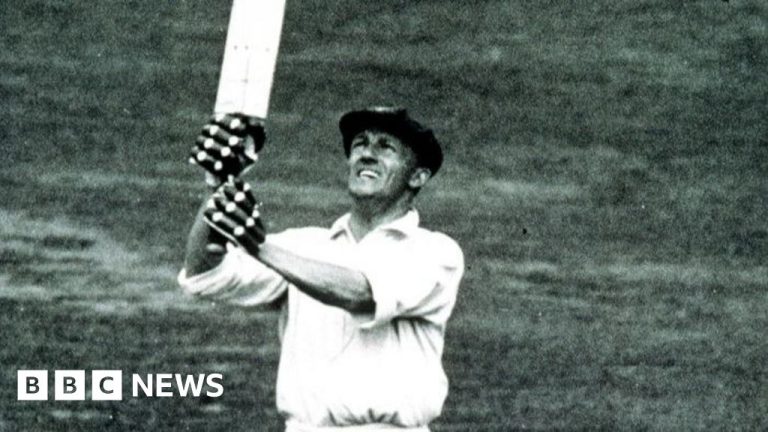Getty Images
India faced mighty Australia led by the legendary Don Bradman in their maiden tour of Australia
India's upcoming cricket tour of Australia continues a historic rivalry that has been evolving since 1947-48. This fierce competition is now as anticipated as the Ashes. But the inaugural tour took place against the harrowing backdrop of India's independence and partition, with cricketers confronting unrest and communal strife at home as they prepared to face the Australian legend Donald Bradman and his “Invincibles”.
In 1947, as India prepared for its first cricket tour of Australia, the country was in the midst of unprecedented upheaval.
Independence was accompanied by the painful partition that gave birth to Pakistan, triggering one of the largest and bloodiest migrations in history. Amid this chaos and as millions of people crossed borders, religious violence spread with Hindus and Sikhs on one side and Muslims on the other. The 16-member Indian cricket team – selected months earlier – also faced both personal and national turmoil as it prepared for a historic series.
Anthony De Mello, chairman of the Board of Control for Cricket in India, announced the team against the backdrop of a map of undivided India, proclaiming that the team would represent all of India.
Until then, the Indian cricket team – known as the “All India” – had toured England for official Test matches only three times between 1932 and 1946, losing the series each time.
But in 1946, future Australian captain Lindsay Hassett took an Australian services team to India to celebrate the Allied victory in World War II. India won the unofficial three-match series 1–0 and Hassett reported to the Australian cricket authorities that the Indians deserved an official Test series.
Getty Images
The partition of India triggered one of the largest migrations in history
Excitement and anticipation was high in Indian cricket circles as the team was set to take on the mighty Australians, led by legendary batsman Donald Bradman. His team was later nicknamed “Bradman's Invincibles” after returning undefeated from England in 1948.
De Mello's Indian team was led by ace opening batsman Vijay Merchant, with his reliable partner Mushtaq Ali as his deputy.
Both had been exceptional on the England tours of 1936 and 1946, cementing their leadership roles. The team also had stylish batting Rusi Modi and promising debutant Fazal Mahmood, adding a dynamic mix of experience and new talent.
But Merchant and Modi withdrew from the tour citing medical reasons. Ali also withdrew after the death of his older brother, leaving him with family responsibilities.
As a result, Lala Amarnath was announced as the new captain and Vijay Hazare as his deputy.
However, the violence that erupted after Partition almost prevented Amarnath from reaching Australia. According to a 2004 biography by her son Rajender Amarnath, Lala Amarnath narrowly escaped a sectarian mob in Patiala, Indian Punjab. His house in Lahore, now Pakistan, along with his priceless possessions, were lost forever.
He also encountered danger while traveling by train to Delhi.
At a police station in Indian Punjab, a police official recognized Amarnath and gave him a kada – a steel bracelet worn by Sikhs and many Hindus as a religious symbol. Later, a crowd at the station spared the cricketer because of the kada – this probably led them to believe he shared their faith.
On the other side of the religious divide, rhythm player Mahmood found himself facing a murderous mob on a train.
The team had planned two weeks of training in Pune (then Poona) starting August 15 – although it was not known then that it was the day of the Partition of India.
Ezekiel Group
Writer Gulu Ezekiel with Lala Amarnath, captain of the Indian team which toured Australia in 1947-48
Despite the restrictions, Mahmood reached Poona for the training camp. Then he traveled to Bombay (now Mumbai) on his way to Lahore. He wrote in his 2003 autobiography that on the train, two men threatened him, but former Indian captain CK Nayudu intervened, bat in hand, and warned them.
Once he arrived in Lahore, under curfew, Mahmood was horrified by the bloodshed he witnessed there and decided to stay in Pakistan and not visit Australia. He later became a member of the Pakistan cricket team and made his Test debut in 1952-53 against India.
Two other members of the Indian team for the tour of Australia – Gul Mohammad and Amir Elahi – also later moved to Pakistan and played against India in the 1952-53 series.
Despite these setbacks, the Indian tour continued, although a weakened India faced Australia without four of their key players and lost the series 4–0.
The two countries now face each other almost every two years. The miracle, however, is that the inaugural tour of 1947-48 took place, given the tumult in the country.
Gulu Ezekiel is the author of 17 sports books, his latest being Salim Durani: The Prince of Indian Cricket, published earlier this year.
Follow BBC News India on Instagram, YouTube, Twitter and Facebook

